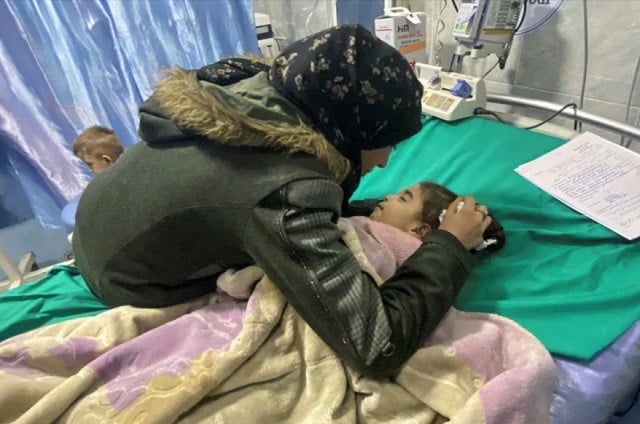GAZA: In a Gaza clinic, two toddler Palestinians with sunken eyes and malnourished faces, one wearing a yellow cardigan and the other a striped top, were laying side by side on a bed, their bony, thin legs sticking out of diapers that appeared to be too big for them.

This was the situation on Monday at the Al-Awda Health Centre in Rafah, southern Gaza, where pediatric nurse Diaa Al-Shaer said that an unusual number of youngsters were arriving with various ailments and malnourishment.
“We will face a large number of patients who suffer from this, which is malnutrition,” she stated.
With his aunt, Israa Kalakh, by his side, the toddler in the yellow cardigan, Ahmed Qannan, weighed 6 kg (13.2 lb), half his pre-war body weight.
“Every day, things get worse for him. God shield us from the impending danger,” she remarked to Reuters.
The United Nations is characterizing the severe food shortages that have followed Israel’s air and ground invasion of Gaza, which resulted in mass displacement, as a nutrition crisis that is a part of a larger humanitarian tragedy, nearly five months after the attack.
The health ministry of Gaza announced on Sunday that fifteen children had perished at Kamal Adwan Hospital in Beit Lahiya, northern Gaza, from starvation or dehydration. This is the area of the enclave where the scarcity of food is most severe.
According to Christian Lindmeier, a spokesman for the World Health Organization, “it is regrettable that the unofficial figures could be higher.”
Israel has come under increasing international criticism because of the growing hunger issue, including criticism from US Vice President Kamala Harris, whose nation is Israel’s closest ally. She declared on Sunday that there was famine in Gaza and urged Israel to take more action to greatly expand the supply of humanitarian goods.
A video shot at Kamal Adwan on Saturday captured Anwar Abdulnabi, a mother, sobbing over the body of her young daughter Mila, who had just passed away in her bed. Reuters was able to access the video.
“My daughter, my beautiful daughter, my gentle daughter has passed away,” Abdulnabi said. Later, while she sobbed, she revealed that Mila had been experiencing potassium and calcium shortages.
Dr. Ahmad Salem, who works in the hospital’s critical care unit, stated that a contributing factor to the high rate of infant fatalities there was the malnourishment of new moms.
“The moms are unable to nurse their kids. There isn’t formula milk here. Children in this intensive care unit have died as a result of this. There are a lot of deaths in the nursery as well,” he stated.
“Desperation and helplessness”
Food aid deliveries to Gaza as a whole are considerably short of what is required, and the situation is made worse in the north by the fact that the only crossings where Israel permits trucks to pass are in the south. Before they could reach the north, some assistance trucks were taken over by irate mobs.
According to Adele Khodr, regional director of UNICEF for the Middle East and North Africa, “the sense of helplessness and despair among parents and doctors in realizing that lifesaving aid, just a few kilometers away, is being kept out of reach, must be unbearable.”
UNRWA, the UN organization for Palestinian refugees, stated in its most recent situation report, dated March 1, that on average, 97 trucks per day entered Gaza in February—much fewer than the 500-a-day target and down from roughly 150 in January.
Humanitarian organizations and UN agencies have attributed the deficit to Israeli policies, which include closing land borders into northern Gaza, continuing military drills, and a convoluted system of Israeli inspections of goods headed for Gaza.
Israel says it does not impose restrictions on humanitarian or medical aid, and it attributes the deficiency in supplies to relief organizations’ limitations. Still, the settler-colonial state’s arguments are not at all consistent with reality.
On October 7, 1,200 Palestinians were killed in an attack on the settler state by the Palestinian resistance group Hamas, many of whom were later slain by Israeli fire. This attack is blamed on Israel. More than 30,000 Palestinians have died as a result of Israel’s cruel siege and subsequent assault of the besieged Palestinian enclave, the majority of whom were women and children.
Yazan Al-Kafarna, 12, passed away on Monday at the Al-Awda health center in Rafah. When he was filmed for Reuters on Saturday, he had bony limbs and was pale and malnourished.
Yazan was treated at Abu Yousef Al-Najar Hospital in Rafah by Dr. Jabir Al-Shaar, the chief of the pediatric department. Yazan had cerebral palsy and was on a special diet that included blended fruit and milk, both of which are no longer available in Gaza.
The boy’s death was attributed by the doctor to starvation. As Palestinian envoy Riyad Mansour mentioned the matter before a UN General Assembly meeting on Monday, it was already gaining popularity.
His final days were spent with his mother, Um Yazan Al-Kafarna.
He used to move, play, laugh, eat, and drink. I played with him once,” she recalled.










































